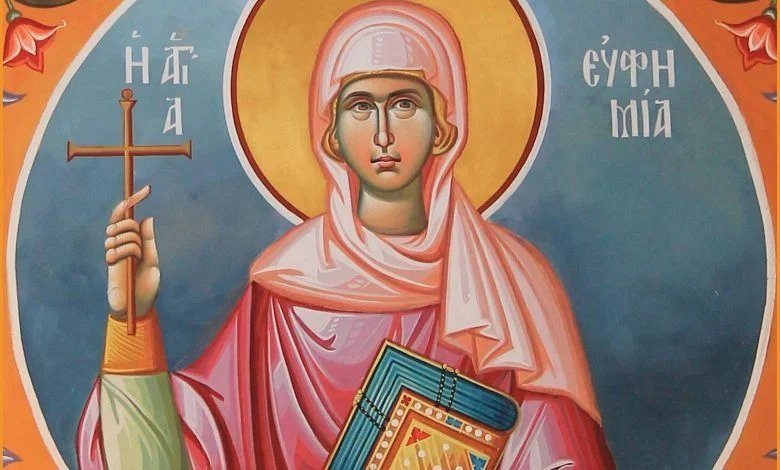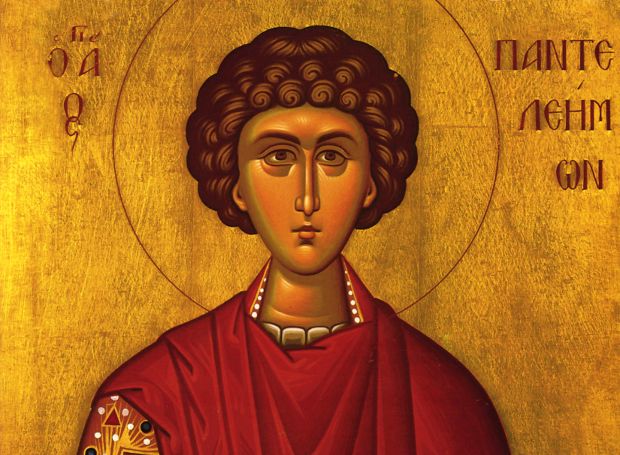Great Martyr Euphemia the All-praised (16 September)


The Holy Great Martyr Euphēmia (Ευφημία) was the daughter of Christian parents, the senator Philophronos and his wife Theodosia. She suffered for Christ in the year 304 in the city of Chalcedon, on the Bosphorus opposite Constantinople, the Queen of Cities.
Priscus, the Proconsul of Chalcedon, issued a decree which required all the inhabitants of Chalcedon and the surrounding area to attend a pagan festival, in order to worship and offer sacrifice to the idol of Ares. He threatened grave torments for anyone who failed to appear. During this impious festival, 49 Christians were hidden in one house, where they worshiped the true God in secret. The young virgin Euphēmia was among those who prayed there.
Soon their hiding place was discovered, and they were brought before Priscus to answer the charges against them. For nineteen days the martyrs were subjected to various torments, but none of them wavered in their faith, nor did they consent to offer sacrifice to the idol. The governor, beside himself with rage and not knowing any other way of forcing the Christians to abandon their faith, sent them to Emperor Diocletian for trial. He kept the youngest, the virgin Euphēmia, hoping that she would not persevere if she were left all alone.
Separated from her fellow-Christians, Saint Euphēmia fervently prayed that the Lord Jesus Christ would strengthen her for her impending ordeal. Priscus urged the Saint to offer sacrifice to the idol, promising her many rewards. When she refused, he ordered that she be tortured.
The martyr was tied to a wheel with sharp knives attached to it, which slashed her body. The Saint prayed aloud, and miraculously, the wheel stopped by itself and would not move despite all the efforts of the executioners. An angel of the Lord, came down from Heaven, removed Euphēmia from the wheel, and healed her of her wounds, and the Saint gave thanks to God.
Priscus did not notice the miracle which had taken place, so he ordered the soldiers Victor and Sosthenes to take the Saint to a red-hot furnace. But the soldiers, seeing two Angels in the midst of the flames, refused to carry out the Proconsul’s order and declared that they believed in the God Whom Euphēmia worshipped. Boldly proclaiming that they were Christians, Victor and Sosthenes awaited punishment. They were sentenced to be devoured by wild beasts. In the arena, they begged God to forgive the sins they had committed, asking the Lord to receive them into the Heavenly Kingdom. A Divine voice was heard, and the two soldiers entered into eternal life. The beasts, however, did not harm their bodies.
Saint Euphēmia, cast into the fire by other soldiers, did not suffer. With God’s help she emerged unscathed after many other torments. Ascribing these things to sorcery, Priscus ordered a pit to be dug. Filling it with knives, he had it covered over with earth and grass, so that the martyr would not notice this trap.
Once again, Saint Euphēmia remained safe, walking over the pit. Finally, she was sentenced to be devoured by wild beasts in the arena. Before her execution the Saint prayed that the Lord would deem her worthy of martyrdom. But none of the bears or lions attacked her, but only licked her feet. Finally, one she-bear wounded her foot, which bled slightly, and the Holy Great Martyr Euphēmia died right away. As her soul departed, there was an earthquake. The city was shaken, the walls fell down, and the pagan temples crumbled. As Saint Euphēmia lay dead in the sand, the guards and spectators fled in terror, so that the Saint’s parents were able to take her body and bury it near Chalcedon.
Later, a majestic church was built over the grave of the Great Martyr Euphēmia. The sessions of the Fourth Ecumenical Council took place there in the year 451. At that time, the Holy Great Martyr Euphēmia confirmed the Orthodox confession of faith in a miraculous way, exposing the Monophysite heresy. That miracle is commemorated on July 11.
When the Persians captured Chalcedon in the year 617, the relics of the holy Great Martyr Euphēmia were transferred to Constantinople (around the year 620). During the Iconoclast heresy, the reliquary containing Saint Euphēmia’s relics seems to have been thrown into the sea, but pious sailors recovered them. They were brought to the island of Lemnos, and they were returned to Constantinople in 796.
The incorrupt body of Saint Euphēmia is in the Patriarchal Church of Saint George at the Phanar in Constantinople. Portions of her relics are to be found in Kykkos Monastery on Cyprus, and in the Saint Alexander Nevsky Lavra at Saint Petersburg.
Saint Euphemia was from Chalcedon and lived in virginity. According to some, she suffered martyrdom during the reign of Diocletian, in 303; according to others, in 307. Her sacred relics are preserved in the Patriarchate in Constantinople.
Euphemia was born in Chalcedon. Her father Philophronus, a senator, and her mother Theodorisia were devout Christians. Euphemia was a beautiful virgin in body and in soul. When the Proconsul Priscus held a feast and offered sacrifices to Ares in Chalcedon, forty-nine Christians avoided this foul sacrificial offering and hid themselves. However, they were discovered and brought before Priscus. Among them was St. Euphemia. When the arrogant Priscus asked them why they defied the imperial decree, they replied: “Both the emperor’s and your command should be obeyed, if they are not contrary to the God of heaven; but if they are contrary to God, they should not only be disobeyed, but should also be opposed.”
For nineteen consecutive days, Priscus imposed various tortures on them. On the twentieth day he separated Euphemia from the others and began to flatter her for her beauty, attempting to win her over to idolatry. As his flattery was in vain, he ordered that the virgin be tortured again. First, they tortured her on the wheel, but an angel of God appeared to Euphemia and shattered the wheel. Then they threw her into a fiery furnace, but she was preserved by the power of God. Upon seeing this, two soldiers, Victor and Sosthenes, came to believe in Christ, for which they were thrown to the wild beasts, and thus gloriously ended their earthly lives.
Euphemia was then thrown into a pit filled with water and every kind of poisonous vermin; but she made the sign of the Cross over the water and remained unharmed. She was finally thrown to the wild beasts and, with a prayer of thanksgiving to God, gave up her spirit. Her parents buried her body honorably. Euphemia suffered in the year 304 A.D. and entered into eternal joy. She is also commemorated on July 11.
Apolytikion of Great Martyr Euphemia
Third Tone
O Euphemia, Christ’s comely virgin, thou didst fill the Orthodox with gladness and didst cover with shame all the heretics; for at the holy Fourth Council in Chalcedon, thou didst confirm what the Fathers decreed aright. O all-glorious Great Martyr, do thou entreat Christ God that His great mercy may be granted unto us.
Kontakion of Great Martyr Euphemia
Fourth Tone
Thou strovest valiantly in thy sacred contest; and even after death, thou makest us holy with streams of healings, O all-famed Euphemia. For this cause we venerate thy most holy dormition and with faith we stand before thine all-ven’rable relics, that we be freed from illness of the soul and also draw forth the grace of thy miracles.
Source: oca.org / goarch.org / westserbdio.org





